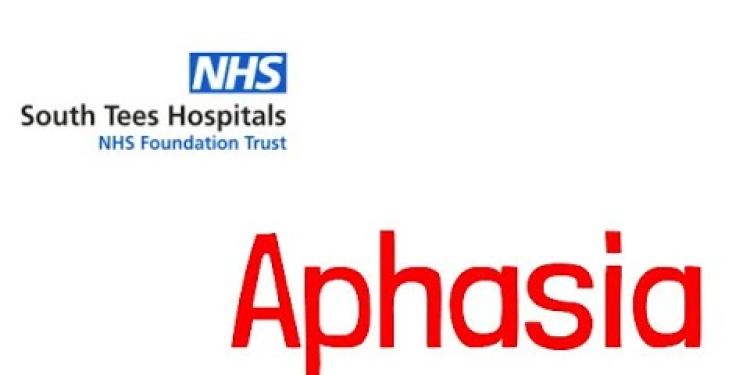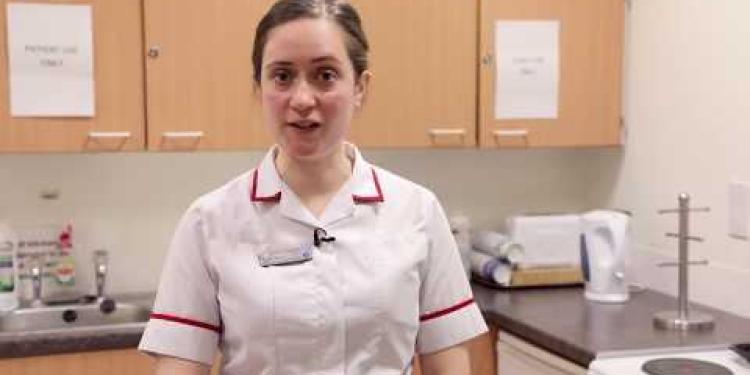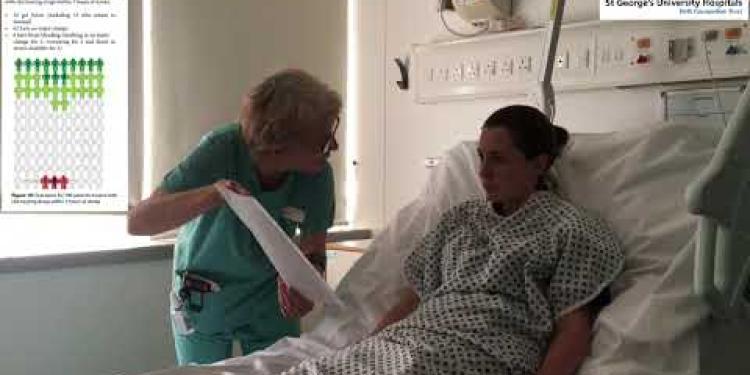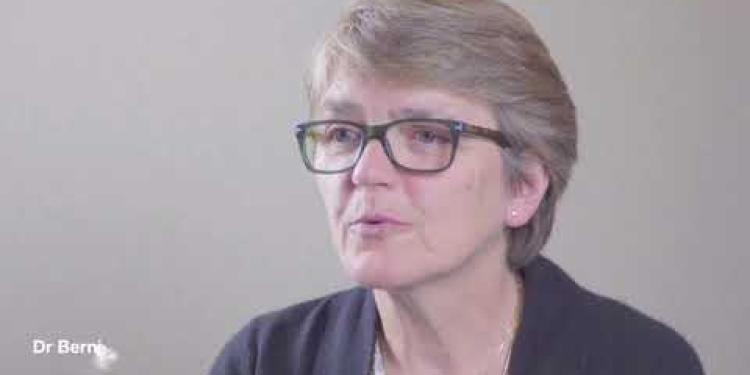Important Information On Using This Service
- Ergsy carefully checks the information in the videos we provide here.
- Videos shown by YouTube after a video has completed have NOT been reviewed by ERGSY.
- To view, click the arrow in the center of the video.
Using Subtitles and Closed Captions
- Most of the videos you find here will have subtitles and/or closed captions available.
- You may need to turn these on and choose your preferred language.
Turn Captions On or Off
- Go to the video you'd like to watch.
- If closed captions (CC) are available, settings will be visible on the bottom right of the video player.
- To turn on captions, click settings.
- To turn off captions, click settings again.
Find A Professional
More Items From Ergsy search
-

Joan's story - Aphasia Awareness
Relevance: 100%
-

South Tees NHS - What is aphasia and how can you help?
Relevance: 84%
-

Stroke - Speech and Language Therapist's Experience
Relevance: 8%
-

Gaining consent from stroke patients
Relevance: 4%
-

An introduction to frontotemporal dementia (FTD) (part 1/3)
Relevance: 4%
South Tees NHS - Understanding Aphasia and How to Support Those Affected
What is Aphasia?
Aphasia is a language disorder that results from damage to parts of the brain responsible for communication. This condition impairs a person's ability to speak, understand, read, or write, although it does not affect their intelligence. Aphasia can occur suddenly, often following a stroke or head injury, or develop slowly due to a brain tumor or progressive neurological disease.
Types of Aphasia
Aphasia varies in severity and can manifest in different forms:
- Broca’s Aphasia: Characterized by difficulty in speaking and writing, but comprehension generally remains intact.
- Wernicke’s Aphasia: Individuals may speak in long sentences that have no meaning, add unnecessary words, and have trouble understanding spoken and written language.
- Global Aphasia: The most severe form, where both expressive and receptive language skills are significantly impaired.
Causes and Diagnosis
The most common cause of aphasia is a stroke, which deprives the brain of blood and oxygen, leading to brain cell death. Other causes include traumatic brain injuries, tumors, infections, and degenerative diseases such as Alzheimer's. Diagnosis typically involves a combination of medical imaging techniques and speech-language assessments to pinpoint the exact location and extent of brain damage.
Caring for Someone with Aphasia
Supporting a person with aphasia requires patience, understanding, and effective communication tactics. The South Tees NHS offers various services designed to help individuals and their families cope with aphasia. Here are some strategies to improve communication:
- Maintain eye contact and speak in a calm and clear manner.
- Use simple sentences and emphasize key words.
- Allow extra time for the individual to respond and encourage them without pressuring.
- Utilize gestures, drawings, or written notes to aid understanding.
- Avoid correcting speech errors too frequently, focusing instead on the message being conveyed.
Accessing Support through South Tees NHS
The South Tees NHS Foundation Trust provides a range of services to support those with aphasia. These include speech and language therapy, psychological support, and community rehabilitation services. For more information or to seek assistance, you can contact your local GP or visit the South Tees NHS website for resources and referral options.
With the right support and resources, individuals with aphasia can improve their communication abilities and maintain a productive and fulfilling life.
South Tees NHS - Understanding Aphasia and How to Help
What is Aphasia?
Aphasia is a problem with talking, understanding, reading, or writing. It happens when a part of the brain gets hurt. It does not affect how smart someone is. Aphasia can happen suddenly, like after a stroke or a hit on the head. It can also happen slowly because of a brain tumor or diseases that get worse over time.
Types of Aphasia
Aphasia can be different for everyone. Here are some types:
- Broca’s Aphasia: It's hard to talk and write, but people can still understand well.
- Wernicke’s Aphasia: People might say long sentences that don’t make sense. They also find it hard to understand others.
- Global Aphasia: This is the most severe form. It is hard both to speak and to understand language.
Causes and Diagnosis
The main cause of aphasia is a stroke. A stroke stops the brain from getting blood and oxygen, and some brain cells die. Other causes include head injuries, tumors, infections, and diseases like Alzheimer’s. Doctors use pictures of the brain and language tests to find out where and how bad the damage is.
Helping Someone with Aphasia
Helping someone with aphasia means being patient and understanding. Here are some ways to help communicate better:
- Look at the person and speak calmly and clearly.
- Use short sentences and stress important words.
- Give them time to reply and be supportive, not pushy.
- Use hand signals, drawings, or notes to help explain.
- Do not correct them too much; focus on what they are trying to say.
Getting Help from South Tees NHS
The South Tees NHS offers services to help people with aphasia. They provide speech and language therapy, emotional support, and activities in the community. To get help, you can talk to your doctor or visit the South Tees NHS website to find resources and how to get support.
With the right help, people with aphasia can get better at talking and have a happy, productive life.
Frequently Asked Questions
What is aphasia?
Aphasia is a condition that affects a person's ability to communicate. It can impact speaking, understanding language, reading, and writing, and is usually the result of a stroke or brain injury.
What causes aphasia?
Aphasia is most often caused by damage to the left side of the brain, which controls language. This damage can be the result of a stroke, head injury, brain tumour, or infection.
How is aphasia diagnosed?
Aphasia is typically diagnosed by a speech and language therapist through a series of language and communication tests, often following imaging such as an MRI or CT scan to assess brain damage.
What are the common symptoms of aphasia?
Symptoms include difficulty speaking, struggling to find the right words, using incorrect words, difficulty understanding others, trouble with reading or writing, and speaking in short or incomplete sentences.
Can aphasia be treated?
While there is no cure for aphasia, speech and language therapy can help improve communication skills. Therapy can be personalised to meet the needs of the individual.
How can family members support a person with aphasia?
Family members can help by being patient, using simple sentences, speaking slowly, and giving the person time to respond. It's also useful to use gestures, pictures, and written words to support communication.
What role does a speech and language therapist play in treating aphasia?
A speech and language therapist works with individuals to improve their language abilities, using exercises and strategies tailored to their specific needs. They also provide support and resources for families and caregivers.
Is aphasia the same as dementia?
No, aphasia and dementia are different conditions. Aphasia is a language disorder typically caused by brain injury or stroke, whereas dementia is a broader decline in cognitive function, which can include memory loss and confusion.
Can someone with aphasia return to work?
Whether a person with aphasia can return to work depends on the severity of their condition and the nature of their job. Some may need to adjust their roles or tasks, and vocational rehabilitation can help.
Are there different types of aphasia?
Yes, there are several types of aphasia, including Broca's aphasia, Wernicke's aphasia, and global aphasia, each affecting different aspects of language and communication.
Can children develop aphasia?
While aphasia is more common in adults, children can also develop the condition, typically following a brain injury or illness. The impact can vary, and specialised therapy is often needed.
What is the prognosis for someone with aphasia?
The prognosis varies depending on factors such as the cause and severity of the brain injury, the person’s age, and the speed at which they receive treatment. Many people make significant improvements with therapy.
Is there any technology that can assist people with aphasia?
Yes, various apps, computer programs, and communication devices can help individuals with aphasia improve their language skills and communicate more effectively.
How common is aphasia?
It is estimated that over 350,000 people in the UK live with aphasia, often as a result of stroke.
Where can I find support for someone with aphasia?
Support can be found through local NHS services, speech and language therapists, charities such as the Stroke Association, and support groups focused on aphasia and related conditions.
What is aphasia?
Aphasia is a problem with talking or understanding words. It can happen after a person hurts their brain, like from a stroke.
Here are some ways to help:
- Use pictures and drawings to show what you mean.
- Speak slowly and use simple words.
- Use a tablet or computer to help share ideas.
Aphasia is when it is hard for a person to talk and understand others. It can also make reading and writing difficult. Aphasia usually happens after a stroke or a hurt brain.
What makes someone get aphasia?
Aphasia is when it is hard to talk or understand words.
It can happen if the brain gets hurt.
This might be because of a stroke or a head injury.
People with aphasia might need help from doctors and speech therapists.
Using pictures or signs can help them communicate better.
Aphasia happens when there is damage to the left side of the brain. This part of the brain helps us use language. Damage can happen if someone has a stroke, gets a bad head injury, has a brain tumor, or an infection.
How do doctors find out if someone has aphasia?
Aphasia is when talking, understanding, reading, or writing is hard. Doctors can help find out if someone has aphasia.
Here is how they do it:
- Talking with the doctor: The doctor will ask simple questions and listen to answers.
- Special tests: The doctor might ask you to name objects or follow instructions. This helps see how you talk and understand words.
- Brain picture: Doctors might take a picture of the brain, like a photo. This is called a scan.
If you find reading tricky, ask a family member or friend to read with you. They can help explain things.
Aphasia is when someone has trouble speaking or understanding words. A doctor who helps with talking and language can find out if someone has aphasia. They use special tests to check how well a person can talk and understand. Sometimes, they look at pictures of the brain, like from an MRI or CT scan, to see if there is any hurt.
What are the common signs of aphasia?
Aphasia is a problem with talking and understanding words. Here are some signs of aphasia:
- Finding it hard to say words.
- Mixing up words when talking.
- Not understanding what people say.
- Having trouble reading or writing.
If you think you have aphasia, it helps to:
- Use simple words and short sentences.
- Point or draw pictures to show what you mean.
- Ask people to speak slowly and clearly.
- Practice speaking, reading, and writing.
- Work with a speech therapist for support.
Signs to look out for:
- Trouble talking
- Hard to find the right words
- Using wrong words
- Difficulty understanding others
- Problems with reading or writing
- Speaking in short or broken sentences
Helpful tools:
- Use pictures to explain.
- Ask yes or no questions.
- Use simple words and sentences.
Can aphasia be treated?
Aphasia can make talking hard. People can get better with help. Speech therapists are people who help you talk. They do special exercises with you.
There are also tools to help. You can use computers or apps. They help practice words.
Family and friends can help too. They can talk slowly and use simple words.
Getting better takes time. Be patient and keep practicing!
There is no way to completely fix aphasia, but there is help. Speech and language therapy can make talking and understanding better. This help can be changed to fit what each person needs.
How can family help someone with aphasia?
Aphasia makes talking and understanding hard.
Here are ways family can help:
- Be patient.
- Use short sentences.
- Use pictures and gestures.
- Write things down.
- Stay calm.
These tools can help:
- Communication boards
- Apps and devices
Helping takes time and practice.
Families can help by being patient. Talk using simple words. Speak slowly. Give the person time to answer. Use hand signs, pictures, and write down words to help them understand.
What does a speech and language therapist do to help people with aphasia?
A speech and language therapist is someone who helps people talk and understand words. They are really good at helping people with aphasia.
Aphasia can make it hard to speak, read, or write. A therapist helps by teaching new ways to communicate. They use exercises and games to make speaking easier.
If you have trouble understanding, the therapist can help you too. They use pictures, gestures, and easy words.
If you want more help, you can also use things like picture cards or apps on a tablet. These tools can make talking easier.
Remember, the therapist is there to help you. They will work with you until you feel better at talking and understanding words.
A speech and language therapist helps people talk and listen better. They use fun exercises and special plans that help each person. They also help families and caregivers with advice and information.
Is aphasia the same as dementia?
No, aphasia is not the same as dementia. They are different things.
Aphasia is when someone has trouble talking and understanding words. It often happens after a stroke or a brain injury.
Dementia is when the brain does not work well over time. It affects memory, thinking, and daily activities.
If you know someone with aphasia or dementia, speak slowly and use simple words. You can also show pictures or write things down to help them understand.
No, aphasia and dementia are not the same. Aphasia is when someone has trouble speaking or understanding words. This usually happens because of a brain injury or a stroke. Dementia is different because it affects more parts of the brain. It makes people forget things and feel confused.
Can a person with aphasia go back to work?
Aphasia is a problem with talking and understanding words. It can happen after a brain injury or stroke.
People with aphasia can go back to work, but it might be hard. They might need help. Here are some ideas to help:
- Speech Therapy: Going to a speech therapist can help with talking and understanding.
- Job Changes: Sometimes, small changes at work can make it easier. This could be working fewer hours or getting extra breaks.
- Support Tools: Use special apps or pictures to help with communication.
- Friendly Support: Encourage friends and coworkers to be patient and understanding.
Everyone is different. Talk with a doctor or therapist to find the best plan.
If someone has a condition called aphasia, it might be hard for them to go back to work. It depends on how bad their aphasia is and what kind of job they do. Some people might have to change what they do at work. Vocational rehabilitation is a way to get extra help to work better.
Are there different types of aphasia?
Aphasia is a problem with talking and understanding words. There are different types of aphasia. Some types make it hard to talk. Other types make it hard to understand. Some people might have trouble reading or writing too.
Using pictures and gestures can help. People can also use apps or devices that talk for them. It's good to practice talking and listening with friends or helpers.
Yes, there are different kinds of aphasia. Aphasia is a problem with talking and understanding words. The different kinds are called Broca's aphasia, Wernicke's aphasia, and global aphasia. Each one makes it hard to speak and understand in different ways.
Can kids get aphasia?
Aphasia is when people have trouble using words. This can make talking, understanding, reading, or writing hard.
Kids can get aphasia if their brain gets hurt. This could happen if they have a bad fall, get hit on the head, or have an illness that affects their brain.
If you think a kid has aphasia, talk to a doctor. A speech therapist can help too. They work with kids to make talking and understanding easier.
Using pictures or apps can also help kids communicate better. Try to be patient and give the child time to share their thoughts.
Aphasia usually happens to grown-ups, but kids can get it too. It can happen after a hurt to the brain or if they get sick. It can be different for each child, and special help is often needed.
What happens if someone has aphasia?
The outlook for getting better depends on a few things. It depends on how the brain got hurt, how bad the hurt is, how old the person is, and how fast they get help. Many people get a lot better with therapy.
Can technology help people with aphasia?
Aphasia is when it's hard to talk or understand words. Technology can help! Here are some tools that might be useful:
- Speech apps: These apps can make talking easier.
- Text-to-speech: This makes your text into voice. It talks for you.
- Picture cards: These help you say what you want using pictures.
It's important to try different tools to see what works best for you. You can ask a speech therapist for more help!
Yes, there are many helpful tools like apps, computer programs, and devices. These can help people with aphasia get better at talking and understanding words.
How many people have aphasia?
Aphasia is a language problem. It can make talking, reading, or writing hard.
About 2 million people have trouble with aphasia in the United States. Every year, many more people get it.
If you find it hard to read, you can ask someone to read aloud to you or use tools that read text out loud.
Over 350,000 people in the UK have aphasia. Aphasia is a condition that makes it hard to speak and understand words. Many people get aphasia after having a stroke.
Where can I get help for someone with aphasia?
If you know someone with aphasia, there are places that can help:
- Visit a doctor or speech therapist. They can give advice and treatment.
- Look for support groups. People there share their experiences.
- Check online resources for tips and information.
- Use picture books or apps to help communication.
You can get help from local NHS services, speech and language therapists, and charities like the Stroke Association. There are also support groups for people with aphasia and similar conditions.
Useful Links
Useful links from: Joan's story - Aphasia Awareness
- NHS - Aphasia The NHS page provides an overview of what aphasia is, including the causes, symptoms, diagnosis, and treatment options available.
- Stroke Association - Aphasia The Stroke Association offers comprehensive information about aphasia, how it can affect individuals post-stroke, and the types of support available.
- Speakability - Talking Point Speakability, part of the Stroke Association, focuses on supporting people with aphasia and their carers, providing resources and community networks.
- AphasiaNow AphasiaNow is a website created by people with aphasia, for people with aphasia, offering resources, support networks, and shared stories.
Have you found an error, or do you have a link or some information you would like to share? Please let us know using the form below.
- Ergsy carfully checks the information in the videos we provide here.
- Videos shown by Youtube after a video has completed, have NOT been reviewed by ERGSY.
- To view, click the arrow in centre of video.
- Most of the videos you find here will have subtitles and/or closed captions available.
- You may need to turn these on, and choose your preferred language.
- Go to the video you'd like to watch.
- If closed captions (CC) are available, settings will be visible on the bottom right of the video player.
- To turn on Captions, click settings .
- To turn off Captions, click settings again.
